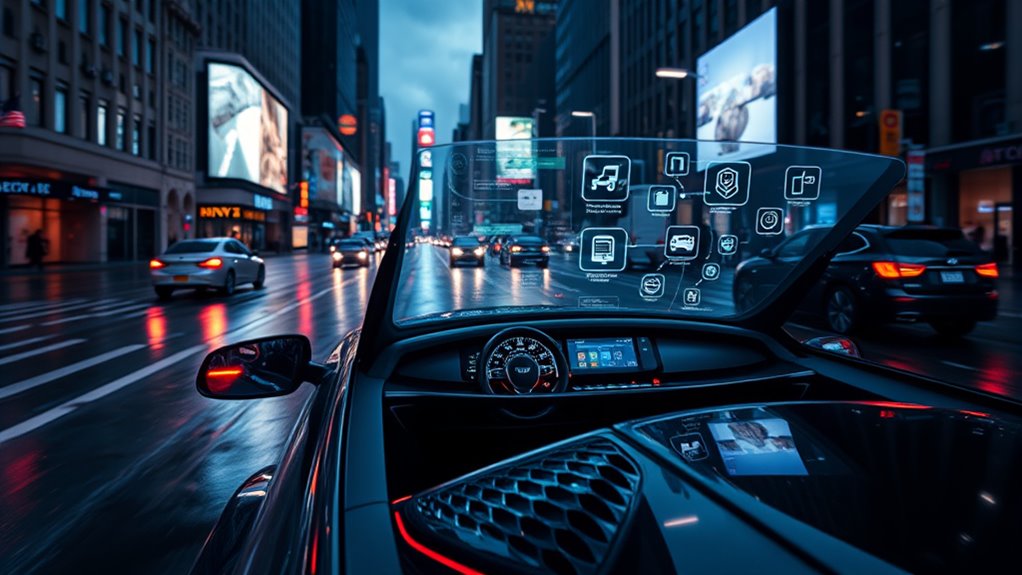When using connected cars, you often grant access to personal data through apps and services, but ownership isn’t always clear. Laws like GDPR and CCPA aim to give you control over your information, allowing you to access, delete, or restrict data sharing. However, manufacturers might still hold significant control over your data, especially if security isn’t strong. If you want to understand how to protect your rights and privacy, keep exploring these important topics.
Key Takeaways
- Vehicle data ownership often depends on manufacturer policies and relevant data privacy laws.
- Connecting a vehicle to apps or services may grant third-party access to personal information.
- Laws like GDPR and CCPA give users rights to access, delete, or restrict their vehicle data.
- Users should review privacy policies to understand how their vehicle data is collected and shared.
- Implementing secure networks and avoiding unsecured connections helps protect vehicle data from unauthorized access.

As vehicles become increasingly connected, the data generated by your car’s sensors, navigation systems, and apps is more valuable than ever. This wealth of information includes everything from your location and driving habits to your personal preferences and even your health data. With so much at stake, understanding how vehicle cybersecurity plays a role in protecting your information is essential. Hackers are constantly seeking vulnerabilities in connected car systems, which can lead to unauthorized access, data theft, or even malicious control of your vehicle. Manufacturers are working to strengthen cybersecurity measures, but it’s important for you to stay informed and cautious. Regular software updates, strong passwords, and awareness of suspicious activity can help safeguard your data. Additionally, the use of sample libraries and sound effects in vehicle alert systems or user interfaces can enhance security features through innovative audio cues.
At the same time, data privacy regulations are evolving to give you more control over your personal information. Laws like the General Data Protection Regulation (GDPR) in Europe and the California Consumer Privacy Act (CCPA) in the U.S. aim to guarantee that companies handle your data responsibly. These regulations require manufacturers and service providers to be transparent about what data they collect, how they use it, and with whom they share it. They also give you rights to access, delete, or restrict your data, empowering you to decide what stays private. However, compliance isn’t always perfect, and some companies might still prioritize profit over privacy. That’s why it’s important to read privacy policies carefully and opt out of data sharing features when possible.
Your ownership of vehicle data isn’t just about legal rights; it’s about real control. When you connect your car to apps or services, you might inadvertently grant access to a range of personal details. Understanding data privacy regulations helps you know what protections exist and how to exercise them. It’s equally critical to consider vehicle cybersecurity, as a breach could not only expose your private information but also compromise your safety. Manufacturers are expected to implement robust security protocols, but as a user, you should also remain vigilant. Using secure networks, avoiding unsecured public Wi-Fi, and being cautious with third-party apps can reduce risks.
Ultimately, your data is a valuable asset, and knowing your rights, staying protected against cyber threats, and advocating for transparent data practices will guarantee that connected cars serve you without sacrificing your privacy or security. Staying informed about vehicle cybersecurity and data privacy regulations isn’t just smart—it’s essential in today’s increasingly connected driving world.
Frequently Asked Questions
How Do Connected Cars Impact Vehicle Insurance Policies?
Connected cars impact your insurance policies by offering opportunities for discounts based on safe driving habits and accident detection technology. Insurance companies can monitor your driving patterns, rewarding you with discounts for good behavior. Additionally, accident detection features can help speed up claims processing, potentially lowering your premiums. You benefit from personalized coverage that reflects your driving, making insurance more tailored, fair, and potentially more affordable.
What Are the Privacy Risks Associated With Connected Car Data?
Are you aware of the privacy risks tied to your connected car? Vehicular surveillance can track your every move, exposing sensitive location data. Data monetization turns your driving habits into profit for corporations, risking your personal information. This ongoing collection and sharing of data can lead to misuse, identity theft, or unwarranted profiling. Protect your privacy by understanding these risks and demanding transparency from manufacturers about data handling practices.
Can Owners Opt Out of Data Collection Entirely?
You can’t usually opt out of data collection entirely due to data privacy and ownership rights. Manufacturers often require some data to ensure safety and functionality. However, you should check your vehicle’s privacy settings; some allow limited control over what data is shared. Be aware that declining certain data collection might affect your vehicle’s features, so balancing your privacy concerns with functionality is essential.
How Is Data Shared Between Manufacturers and Third Parties?
Data sharing occurs through manufacturer collaboration, where manufacturers often share your data with third parties like service providers or partners. They do this to improve features, enhance safety, or support third-party services. You should review your privacy settings and terms of service, as manufacturers may not always seek explicit consent. Staying informed helps you understand how your data flows between manufacturers and third parties, giving you more control over your information.
What Legal Rights Do Owners Have Over Their Connected Car Data?
You have legal rights over your connected car data, including ownership rights that let you control how it’s used and shared. Data ownership means you can access, transfer, or delete your data, depending on local laws and your agreement with the manufacturer. Laws vary by jurisdiction, but generally, you hold the right to privacy and to be informed about data collection, ensuring you’re empowered to make decisions about your connected car data.
Conclusion
While it’s natural to worry about losing control over your data, remember that with clear ownership rights and transparent policies, you remain empowered. By understanding your rights and choosing providers that prioritize privacy, you can enjoy the benefits of connected cars without sacrificing your autonomy. Embracing this balance ensures you drive confidently, knowing your data is protected and your preferences are respected—making connected cars a true extension of your personal space.









